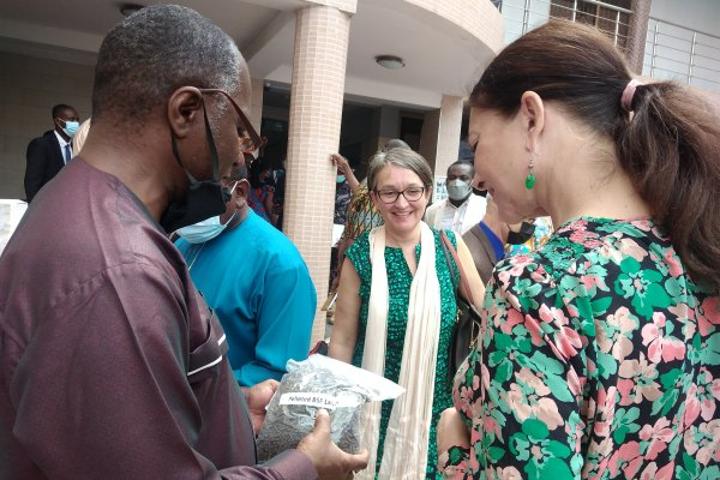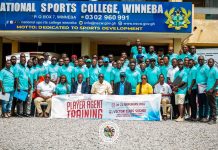Africa-Press – Ghana. The International Institute of Tropical Agriculture (IITA) Ghana has launched the “Black Soldier Fly (BSF)” Project to improve urban sanitation, address biowaste management and mitigate climate change.
The three-year project is titled: “Chicken and Fish Feed and Organic Fertiliser Value Chain Development Using Black Soldier Fly-Based Urban Biowaste Processing in Ghana, Mali and Niger,”
The project, piloted in the Nsawam-Adoagyiri Municipality of the Eastern Region, will turn vegetable or fruit and slaughterhouse waste into chicken and fish feeds and organic fertilizer using the Black Soldier Fly larvae. The $7.5 million project is being funded by the The Norwegian Government, through the Norwegian Agency for Development Cooperation (NORAD).
Its overall objective is to improve the livelihood of smallholder chicken, fish and vegetable producers and other value chain actors and contribute to improved sanitation and and ultimately reduce the effects of climate change.
It is also meant to understand the current and future biowaste streams to inform the design of a business model for sustainable biowaste management, animal feed, and organic fertiliser production.
The project will establish chicken, fish feed and organic fertiliser value chains while optimising the potential of BSF biowaste processing, build capacities and BSF technology knowhow of youth agripreneurs and other stakeholders.
Dr May-Guri Saethre, Senior Advisor, NORAD, in an address to launch the project, said chicken and fish farming were among the most rapidly expanding private sectors in African agriculture, and that the industry was currently based on traditional animal feed sources such as soybeans, wild fish and maize meal.
She said the rapid growth of the private sector demanded increased efforts to find alternative feed sources, competitive in price and quality, without occupying additional agricultural land.
In West Africa, she said, a large amount of biowaste was generated in urban markets particularly in fruit and vegetable markets, adding that by-products produced by slaughterhouses were often underutilised and generated additional waste sources.
She added that, consequently, biowastes accumulated in open and unregulated sites, created unsanitary environmental conditions that posed public health risks and contributed to greenhouse gas emissions.
As a remedy, the NORAD Special Adviser, said the project would turn the slaughter waste into chicken and fish feeds and organic fertilizer, which would further generate multiple benefits, including clean environment, job creation, empowerment of youth and women in households, urban city, and peri-urban landscape.
She noted that to be able to start delivering impacts within the three years of implementation, the project was delivering business models, capacity building and policies and regulations for use of insect protein suitable for each country.
Dr Saethre indicated that the project could make important contributions to the development of sustainable and profitable production of animal and fish feed, and fertilizer based on the BSF and organic waste while simultaneously addressing the many sanitation problems and reducing greenhouse emission.
Mr Mohammed Hardi Tufeiru, Deputy Minister, Food and Agriculture in charge of Livestock, said currently, more than 90 per cent of waste generated in Africa was disposed of in uncontrolled dumpsites and landfills.
Also, he observed that food demands were increasing, and consumption patterns changing, with dietary diversification into diverse vegetables, fruits and livestock products.
However, he said, farming systems in sub-Saharan Africa remained unsustainable, making the trajectory of food supplies incompatible with the food demand.
The Deputy Agric Minister said the “Black Soldier Fly” project would address the challenges of unsustainable biowaste management and unsustainable supply of animal feed and fertiliser.
Dr Kenton Dashiell, Deputy Director General, Partnership for Delivery, IITA, called for stronger collaboration and partnership among the implementing agencies to guarantee the success of the project.
Mr Victor Agyemang, Director General, Council for Scientific and Industrial Research (CSIR), said, if effectively implemented and scaled-up, the project would produce transformative impacts and contribute towards national development of the three participating countries. GNA
For More News And Analysis About Ghana Follow Africa-Press







